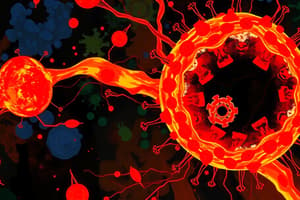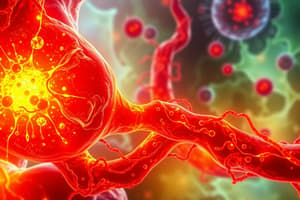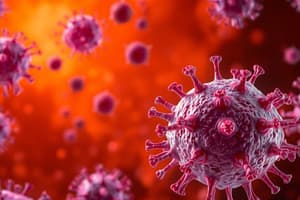Podcast
Questions and Answers
What characterizes acute inflammation?
What characterizes acute inflammation?
- Rapid onset with swelling and redness (correct)
- Prolonged duration and tissue damage
- Results primarily from autoimmune reactions
- Requires adaptive immunity to resolve
What is the primary function of cytokines in the inflammatory process?
What is the primary function of cytokines in the inflammatory process?
- Cause vasodilation of blood vessels
- Recruit immune cells to the site of injury (correct)
- Increase temperature to reduce pathogen growth
- Stimulate blood clot formation
Which type of immune response is characterized by its immediate, non-specific action?
Which type of immune response is characterized by its immediate, non-specific action?
- Adaptive immunity
- Passive immunity
- Acquired immunity
- Innate immunity (correct)
Which condition arises when the immune system mistakenly attacks the body's own cells?
Which condition arises when the immune system mistakenly attacks the body's own cells?
What condition is described as an inadequate blood flow to meet tissue demands?
What condition is described as an inadequate blood flow to meet tissue demands?
Which type of reaction is characterized by an exaggerated response to an antigen?
Which type of reaction is characterized by an exaggerated response to an antigen?
What does thrombosis refer to?
What does thrombosis refer to?
Which term refers to the obstruction of a blood vessel by a traveling clot or foreign material?
Which term refers to the obstruction of a blood vessel by a traveling clot or foreign material?
Flashcards are hidden until you start studying
Study Notes
Inflammation Processes
- Definition: Inflammation is a protective biological response to harmful stimuli, including pathogens, damaged cells, and irritants.
- Types of Inflammation:
- Acute: Rapid onset, characterized by swelling, redness, heat, and pain; often resolves quickly.
- Chronic: Prolonged duration, leading to tissue damage and can contribute to various diseases (e.g., arthritis, heart disease).
- Phases of Inflammation:
- Vascular Phase: Increased blood flow and permeability of vessels; results in redness and swelling.
- Cellular Phase: Recruitment of immune cells (neutrophils, macrophages) to the site of injury.
- Mediators:
- Cytokines: Proteins that facilitate communication between cells (e.g., TNF-a, IL-1).
- Chemokines: Subset of cytokines that attract immune cells to the inflammation site.
- Prostaglandins & Leukotrienes: Lipid compounds that further regulate inflammation and promote pain.
Immune Response Alterations
- Types of Immune Responses:
- Innate Immunity: First line of defense; immediate but non-specific response (e.g., physical barriers, phagocytes).
- Adaptive Immunity: Specific response that develops over time through exposure (e.g., B and T lymphocytes).
- Alterations in Immune Response:
- Hypersensitivity Reactions: Exaggerated responses to antigens; classified into four types (I-IV).
- Autoimmunity: Immune system mistakenly attacks healthy cells; examples include lupus and rheumatoid arthritis.
- Immunodeficiency: Reduced ability to fight infections; can be primary (genetic) or secondary (acquired, e.g., HIV).
- Immuno-inflammatory Conditions:
- Chronic Inflammatory Diseases: Diseases characterized by persistent inflammation (e.g., Crohn's disease, asthma).
Hemodynamic Disorders
- Definition: Disorders related to the circulation of blood and the forces involved.
- Types of Disorders:
- Shock: Acute condition where blood flow is inadequate to meet tissue demands; can lead to organ failure.
- Thrombosis: Formation of a blood clot within a blood vessel; can lead to ischemia or infarction.
- Embolism: Obstruction of a blood vessel by a blood clot or foreign material traveling through the bloodstream.
- Hemorrhage: Excessive bleeding resulting from vessel rupture or injury; can be external or internal.
- Regulatory Mechanisms:
- Vasoconstriction and Vasodilation: Regulation of blood pressure and flow in response to various stimuli.
- Fluid Balance: Maintenance of appropriate blood volume and pressure through mechanisms such as the renin-angiotensin-aldosterone system (RAAS).
Inflammation Processes
- Inflammation is a protective response to injury or infection.
- It involves increased blood flow, vessel permeability, and immune cell recruitment.
- Acute inflammation has rapid onset and resolves quickly, while chronic inflammation is prolonged and can cause tissue damage.
- Key inflammatory mediators include cytokines, chemokines, prostaglandins, and leukotrienes.
Immune Response Alterations
- Innate immunity provides an immediate, non-specific defense, while adaptive immunity is a specific response that develops over time.
- Hypersensitivity reactions are exaggerated responses to antigens.
- Autoimmunity occurs when the immune system attacks healthy cells.
- Immunodeficiency is characterized by a weakened immune system, making individuals more susceptible to infections.
- Chronic inflammatory diseases are characterized by persistent inflammation.
Hemodynamic Disorders
- Hemodynamic disorders involve disruptions in blood flow and related forces.
- Shock is a life-threatening condition caused by inadequate blood flow to tissues, potentially leading to organ failure.
- Thrombosis is the formation of a blood clot within a blood vessel, potentially obstructing blood flow.
- Embolism is the blockage of a blood vessel by a traveling clot or foreign material.
- Hemorrhage refers to excessive bleeding due to vessel rupture or injury.
- Vasoconstriction and vasodilation are crucial in regulating blood pressure and flow.
- Fluid balance is maintained through mechanisms like the RAAS, ensuring adequate blood volume and pressure.
Studying That Suits You
Use AI to generate personalized quizzes and flashcards to suit your learning preferences.





